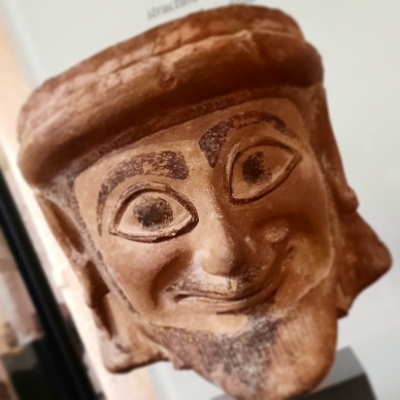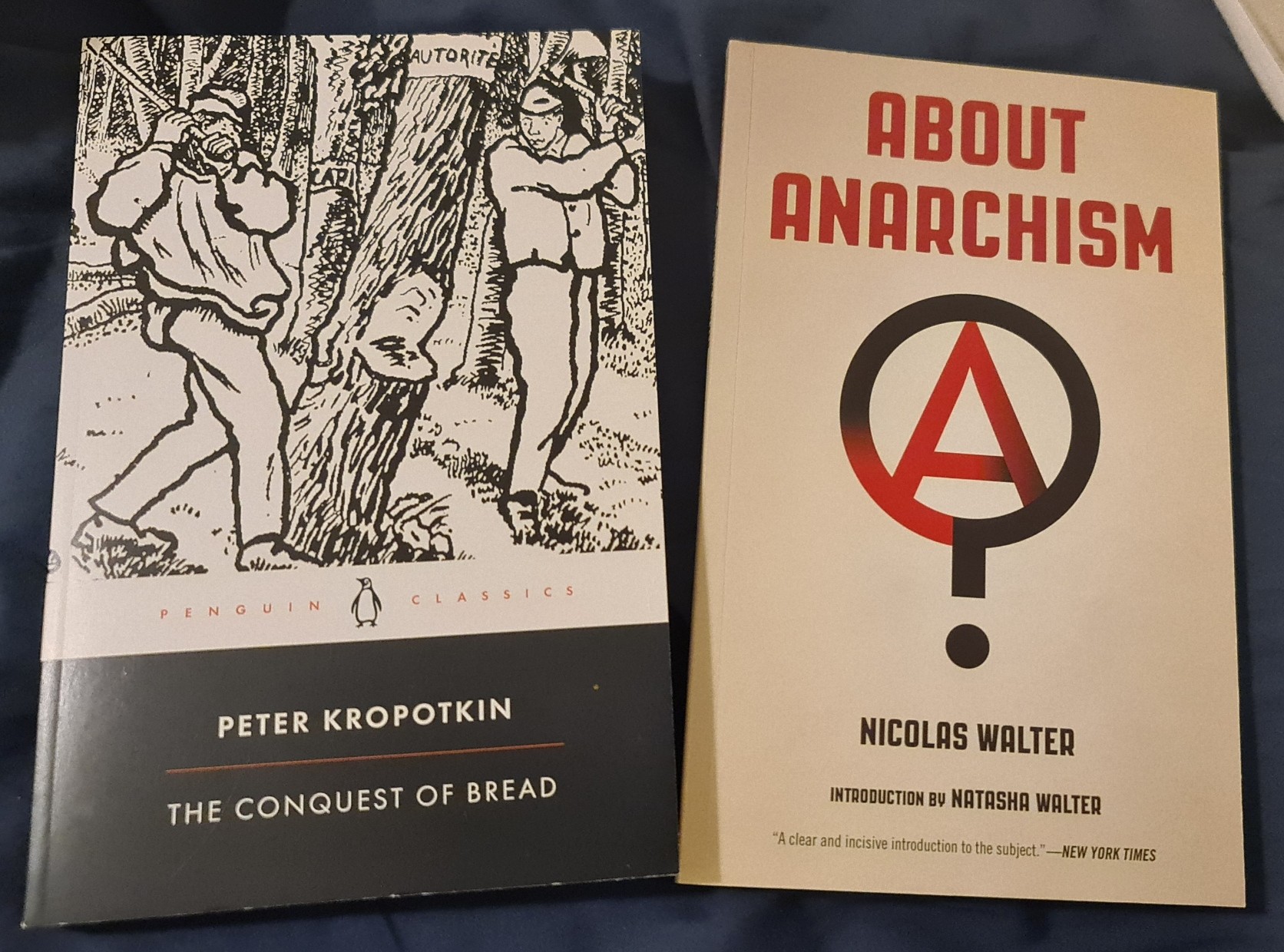#взаимопомощь по Кропоткину
#mutualAid according to #Kropotkin
#kropotkin
See tagged statuses in the local BookWyrm community
Look at what I gifted myself for Trump's birthday 😍
#anarchy #kropotkin #books
Look at what I gifted myself for Trump's birthday 😍
#anarchy #kropotkin #books
I just ordered a copy of "The Conquest of Bread" by Peter Kropotkin.
- AK Press: https://www.akpress.org/the-conquest-of-bread-new.html
- The Anarchist @library: https://theanarchistlibrary.org/library/petr-kropotkin-the-conquest-of-bread
"It takes a village, but not everyone is in your village. That's ok.
Cobble your village together from the smoldering wreckage of the city or country around you.
This is the essence of mutual aid and will be more crucial than ever. Mutual aid isn't just giving money to the friend whose city burnt down before yours.
Share your knowledge. Share your wisdom & your fears. Share your compassion. Share your joy and your tears. Share your skills & yes, even your bills."
#JoanMastodon #TTJ
#ResInt #Kropotkin #MutualAid #Anarchism #AntifaAF #AnarchoSyndicalism #Village
"It takes a village, but not everyone is in your village. That's ok.
Cobble your village together from the smoldering wreckage of the city or country around you.
This is the essence of mutual aid and will be more crucial than ever. Mutual aid isn't just giving money to the friend whose city burnt down before yours.
Share your knowledge. Share your wisdom & your fears. Share your compassion. Share your joy and your tears. Share your skills & yes, even your bills."
#JoanMastodon #TTJ
#ResInt #Kropotkin #MutualAid #Anarchism #AntifaAF #AnarchoSyndicalism #Village
#Anarquismo #Anarquista #AnarcoComunismo #ComunismoLibertario #ApoyoMutuo #AyudaMutua #Libertad #Opresion #Esclavitud #Tirania #Policia #Leyes #Plutocracia #Riqueza #Desigualdad #LibertadPositiva #LibertadNegativa #ClaseTrabajadora #ClaseObrera #LuchaDeClases #Burguesia #Liberalismo #FilosofíaPolitica #PropiedadPrivada
#Economia #Kropotkin #PiotrKropotkin #Bakunin #MijailBakunin #Capitalismo #Explotacion #Esclavitud #Gobierno #Estado #Empresario #LibreMercado #Finanzas #Salario #ClaseObrera #ClaseProletaria
#Anarquismo #Anarquista #AnarcoComunismo #ComunismoLibertario #ApoyoMutuo #AyudaMutua #Libertad #Opresion #Esclavitud #Tirania #Policia #Leyes #Plutocracia #Riqueza #Desigualdad #LibertadPositiva #LibertadNegativa #ClaseTrabajadora #ClaseObrera #LuchaDeClases #Burguesia #Liberalismo #FilosofíaPolitica #PropiedadPrivada
#Economia #Kropotkin #PiotrKropotkin #Bakunin #MijailBakunin #Capitalismo #Explotacion #Esclavitud #Gobierno #Estado #Empresario #LibreMercado #Finanzas #Salario #ClaseObrera #ClaseProletaria
"El verdadero revolucionario es un ilegal por excelencia. El hombre que ajusta sus actos a la Ley podrá ser, a lo sumo, un buen animal domesticado; pero no un revolucionario.
El que predica a los trabajadores que dentro de la Ley puede obtenerse la emancipación del proletariado, es un embaucador, porque la Ley ordena que no arranquemos de las manos del rico la riqueza que nos ha robado, y la expropiación de la riqueza para el beneficio de todos es la condición sin la cual no puede conquistarse la emancipación humana.
Las libertades conquistadas por la especie humana son la obra de los ilegales de todos los tiempos que tomaron las leyes en sus manos y las hicieron pedazos."
-Ricardo Flores Magón.
#Anarquismo #Anarquista #AnarcoComunismo #ComunismoLibertario #ApoyoMutuo #AyudaMutua #Libertad #Opresion #Esclavitud …
"El verdadero revolucionario es un ilegal por excelencia. El hombre que ajusta sus actos a la Ley podrá ser, a lo sumo, un buen animal domesticado; pero no un revolucionario.
El que predica a los trabajadores que dentro de la Ley puede obtenerse la emancipación del proletariado, es un embaucador, porque la Ley ordena que no arranquemos de las manos del rico la riqueza que nos ha robado, y la expropiación de la riqueza para el beneficio de todos es la condición sin la cual no puede conquistarse la emancipación humana.
Las libertades conquistadas por la especie humana son la obra de los ilegales de todos los tiempos que tomaron las leyes en sus manos y las hicieron pedazos."
-Ricardo Flores Magón.
#Anarquismo #Anarquista #AnarcoComunismo #ComunismoLibertario #ApoyoMutuo #AyudaMutua #Libertad #Opresion #Esclavitud #Tirania #Policia #Leyes #Plutocracia #Riqueza #Desigualdad #LibertadPositiva #LibertadNegativa #ClaseTrabajadora #ClaseObrera #LuchaDeClases #Burguesia #Liberalismo #FilosofíaPolitica #PropiedadPrivada
#Economia #Kropotkin #PiotrKropotkin #Bakunin #MijailBakunin #Capitalismo #Explotacion #Esclavitud #Gobierno #Estado #Empresario #LibreMercado #Finanzas #Salario #ClaseObrera #ClaseProletaria
"El obrero tiene siempre el derecho de abandonar a su patrón. Pero, ¿tiene los medios para hacerlo? Y si de hecho le deja, ¿es para llevar una existencia libre, sin otro amo excepto él mismo? No, lo hace a fin de venderse a otro patrón. Se ve impulsado a ello por la misma hambre que le forzó a venderse al primer empresario. De este modo, la libertad del obrero —tan exaltada por los economistas, juristas y burgueses republicanos— es solo una libertad teórica que carece de medio alguno para su realización. En consecuencia, es solo una libertad ficticia, una completa falsedad. La verdad es que toda la vida del trabajador constituye simplemente una serie continua y descorazonadora de servidumbres —voluntarias desde el punto de vista jurídico, pero forzosas en el sentido económico— rota por breves intervalos de libertad acompañados de hambre;
en otras palabras, es una verdadera esclavitud."
-Mijail Bakunin
"El obrero tiene siempre el derecho de abandonar a su patrón. Pero, ¿tiene los medios para hacerlo? Y si de hecho le deja, ¿es para llevar una existencia libre, sin otro amo excepto él mismo? No, lo hace a fin de venderse a otro patrón. Se ve impulsado a ello por la misma hambre que le forzó a venderse al primer empresario. De este modo, la libertad del obrero —tan exaltada por los economistas, juristas y burgueses republicanos— es solo una libertad teórica que carece de medio alguno para su realización. En consecuencia, es solo una libertad ficticia, una completa falsedad. La verdad es que toda la vida del trabajador constituye simplemente una serie continua y descorazonadora de servidumbres —voluntarias desde el punto de vista jurídico, pero forzosas en el sentido económico— rota por breves intervalos de libertad acompañados de hambre;
en otras palabras, es una verdadera esclavitud."
-Mijail Bakunin
#Anarquismo #Anarquista #AnarcoComunismo #ComunismoLibertario #ApoyoMutuo #AyudaMutua #Libertad #Opresion #Esclavitud #Tirania #Policia #Leyes #Plutocracia #Riqueza #Desigualdad #LibertadPositiva #LibertadNegativa #ClaseTrabajadora #ClaseObrera #LuchaDeClases #Burguesia #Liberalismo #FilosofíaPolitica #PropiedadPrivada
#Economia #Kropotkin #PiotrKropotkin #Bakunin #MijailBakunin #Capitalismo #Explotacion #Esclavitud #Gobierno #Estado #Empresario #LibreMercado #Finanzas #Salario #ClaseObrera #ClaseProletaria
#Anarquismo #Anarquista #AnarcoComunismo #ComunismoLibertario #ApoyoMutuo #AyudaMutua #Libertad #Opresion #Esclavitud #Tirania #Policia #Leyes #Plutocracia #Riqueza #Desigualdad #LibertadPositiva #LibertadNegativa #ClaseTrabajadora #ClaseObrera #LuchaDeClases #Burguesia #Liberalismo #FilosofíaPolitica #PropiedadPrivada
#Economia #Kropotkin #PiotrKropotkin #Bakunin #MijailBakunin #Capitalismo #Explotacion #Esclavitud #Gobierno #Estado #Empresario #LibreMercado #Finanzas #Salario #ClaseObrera #ClaseProletaria
1/7 Voy a rascar un poco a #kropotkin :
Llegar al comunismo supone una ruptura con el sistema actual. Un ataque frontal a la propiedad privada y por tanto, un enfrentamiento con los tenedores de dicha propiedad; con el estado que les es util, con el monopolio de la violencia con la que reprimen y el de la justicia con el que castigan.
¿ Estamos o vamos a estar en condiciones, tanto ideologicas como materiales, para confrontar al poder ?
Y si la respuesta es que no podemos ¿Que via nos queda?
📣 Reeditamos 'La moral anarquista', de Piotr Kropotkin
#Kropotkin escribió 'La moral anarquista' en 1889 como parte de su proyecto para crear una base científica a la teoría del "apoyo mutuo", la base del #anarcocomunismo.
Esta nueva edición cuenta además con el texto '¿Somos lo suficientemente buenos?', donde Kropotkin analiza la naturaleza humana y nuestra inclinación hacia el altruismo y la cooperación.
https://descontrol.cat/portfolio/la-moral-anarquista-de-piotr-kropotkin/
📣 Reeditamos 'La moral anarquista', de Piotr Kropotkin
#Kropotkin escribió 'La moral anarquista' en 1889 como parte de su proyecto para crear una base científica a la teoría del "apoyo mutuo", la base del #anarcocomunismo.
Esta nueva edición cuenta además con el texto '¿Somos lo suficientemente buenos?', donde Kropotkin analiza la naturaleza humana y nuestra inclinación hacia el altruismo y la cooperación.
https://descontrol.cat/portfolio/la-moral-anarquista-de-piotr-kropotkin/
「 #Kropotkin rode a penny farthing. His nephew Nicholas Alexeivich visited Kropotkin in 1886 as a child and later recalled in a 1931 article that, “I remember that our uncle astonished us with his adroitness in physical exercises, in bicycling, when that was still new in England” 」
「 #Кропоткин водил пенни-фартинг. Его племянник Николай Алексеевич в детстве гостил у Кропоткина в 1886 году и позже вспоминал в статье 1931 года: «Я помню, что дядя поразил нас своей ловкостью в физических упражнениях, в езде на велосипеде, когда это было еще в новинку в Англии» 」
#велосипед #bike #bicycle
Собственноручное письмо на почтовой карточке, адресованное издателю К.Ф. Кейзнову. Лондон, 28 июня 1912 г.
В письме говорится о технических моментах подготовки рукописи: о внесении изменений в карты и приложения, о добавлении иллюстраций. Вероятно, речь идёт об издании: #Kropotkin P. Fields, factories and workshops or Industry combined with agriculture and brain work with manual work. London: T. Nelson & Sons, 1912. (#Кропоткин, П. Поля, фабрики и мастерские: промышленность, соединенная с земледелием, и умственный труд с ручным. Лондон, 1912). Книга содержала более двух десятков приложений, и практически в каждом новом издании они исправлялись и дополнялись.
“Yes, gentlemen, it is with a heavy heart and the deepest of distaste that we order letters to be opened, but it is entirely because the country (i.e. the aristocracy and the bourgeoisie) is in danger”
“Да, господа, с глубоким отвращением вскрываем мы письма, но что же делать, ведь отечество (вернее, аристократия и буржуазия) в опасности!”

























